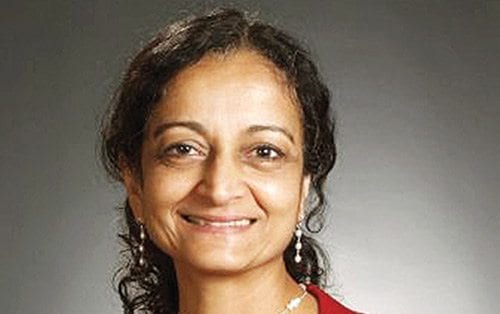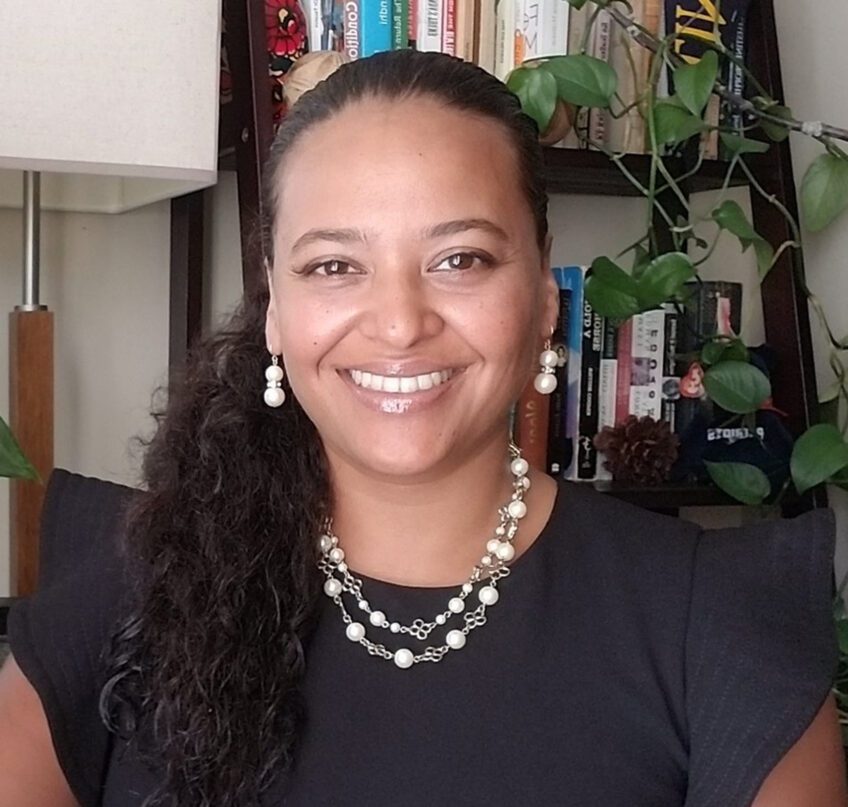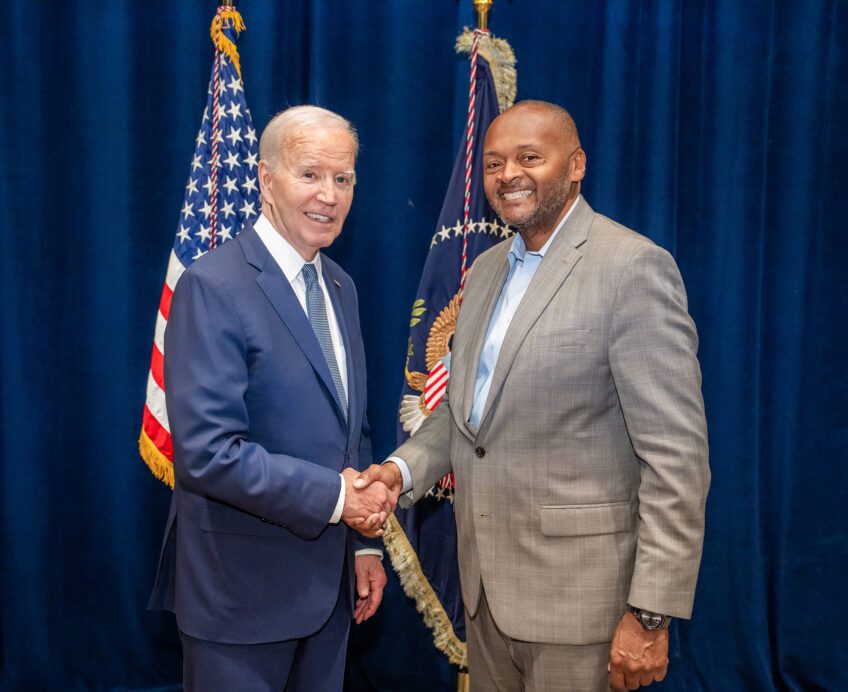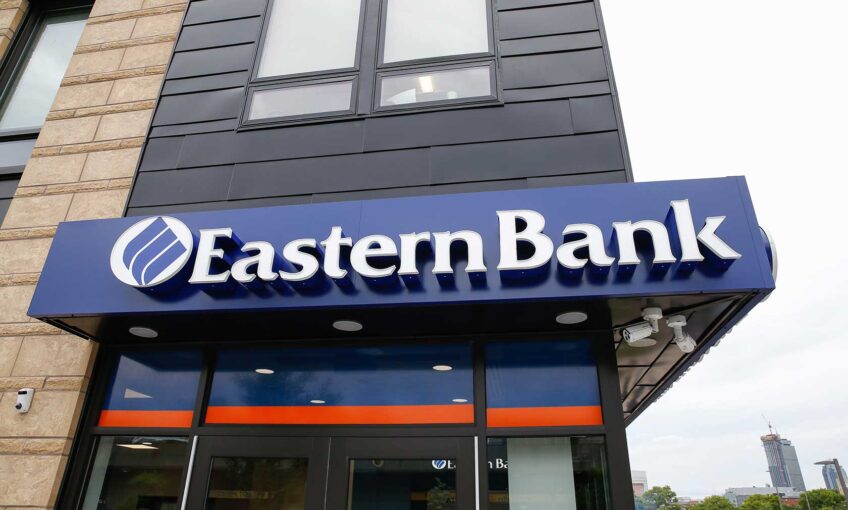Geeta Aiyer: A life of integrity
Entrepreneur fosters a business culture of collaboration and social justice

“Business and finance have a stake in maintaining great community environments,” Geeta Aiyer said during a recent conversation about bridging the equity gap. Aiyer, founder and president of Boston Common Asset Management, oversees more than $2 billion on behalf of a variety of visionary institutional and individual investors who believe in the firm’s integrated, successful model of engaged and sustainable global investing.
“We work to make a difference with the corporations whose stock we own, for what we consider valid business reasons,” she said. “Not just to change them, but to change the dialogue and the systemic views that are prevailing — particularly regarding lack of opportunity and mobility, and the extreme inequality that we’re seeing, within the U.S. in particular, as well as in the wider world.”
At Boston Common, environmental, social and governance (ESG) research is combined with quantitative and fundamental analysis to build diversified portfolios of high-quality holdings. Boston Common also is a long-term, activist global investor that engages directly with portfolio companies to promote transparency, accountability and long-term thinking. The firm is a leader in the now-sprawling ethical investing industry, one that, at latest count, comprises $6.57 trillion in assets under professional management. That’s one out of every six dollars invested according to socially responsible investment strategies.
Money for good
Aiyer has achieved great success in a field she helped shape, disproving outdated theories that “ethics” and “finance” occupy separate worlds. While she remains optimistic, she’s also worried about the course on which this country is moving, that this isn’t the America, land of opportunity and justice for all, which she envisioned when she moved here from India in 1983 to attend Harvard Business School, where in 1985 she received her MBA in finance. (She still has family in India.)
“We are given this opportunity to nurture this wonderful land of promise, embracing its possibilities, including all who are here, seeing our connected future,” she said last June in her “Parents Address” at Buckingham, Brown & Nichols’ graduation ceremonies.
Aiyer — a philanthropist and social activist as well as an entrepreneur and business leader — believes firmly in the role markets can play to improve society. After Harvard, she worked as a consultant at Cambridge Associates (1985-1988), a global institutional investment advisor. Around that time, she also founded a company called East India Spice, the first of several entrepreneurial ventures. In 1988, she moved to U.S. Trust where she was a senior portfolio manager for six years. She then founded Walden Capital Management and continued as its president following its sale, before moving on to launch Boston Common Asset Management in 2003. At both companies, she’s fostered a business culture of collaboration and teamwork as well as social responsibility.
Boston Common is employee-owned, and supports paid time for employees to volunteer. It’s also a place that seeks to redress systemic inequities in our society, particularly after the Great Recession. “We recently observed Stand Against Racism Day in our office,” she said, referring to the national YWCA’s annual event held last April.3 “We had a talk on the Federal Reserve study on the extent of net worth in racial and ethnic communities. Only eight dollars of net worth in the African American community! That gave everybody pause. Of course [African Americans] are worried. They’re being left behind.”
On volunteering and philanthropy
Aiyer has two daughters, one off to New York University this fall to enroll in its combined program on global public health and nursing. At her BB&N graduation, Aiyer’s younger daughter Jaya was honored with an award for her high ethical standards in promoting social justice and cultural awareness.5 After working at the Food Project, eldest daughter Lila returns to Oberlin to complete her degree in environmental studies.
An activist in her personal life, Aiyer can be seen at local rallies and demonstrations, protesting environmental degradation or inequality. “I’ve always been engaged with these kinds of issues,” she reflected. “I went to the Dudley Square protest and the State House protest for Black Lives Matter. What I do as a person has to reflect and protect my own values, whether it’s better working conditions in outsourced locations, or fair wages here, or immigration or the environment. I think we should support [causes] with our means. With money, with voice, wherever we are in age, right?”
She embodies that notion by giving away ten percent of her earnings to worthy causes, remains active in the Women Donor Network and supports the Boston Women’s Fund.
As a social entrepreneur, Aiyer founded Boston-based Direct Action for Women Now Worldwide (DAWN), a nonprofit that tackles gender-based violence through partner organizations in India. She’s also served as board member of several environmental, social justice and cultural institutions, including the Sierra Club Foundation, Earthworks, Worldwatch Institute, YW Boston, and NE Foundation for the Arts.
Her involvement with YW Boston helps strengthen the revised mission of that stalwart institution. “It’s called YW these days,” she explained. “We’ve changed our objectives at the YW, which now involve taking a stand against racism, and social and gender inequality. I believe that the work we do, through youth/police dialogues, through including young people — from students to people working in corporate settings — fosters an awareness of inequality.”
1 For more, go to http://www.bostoncommonasset.com/.
2 See the U.S. Social Investment Foundation’s biennial Report on US Sustainable, Responsible and Impact Investing Trends (2014), http://www.ussif….
3 See http://standagainstracism.org/.
4 For more on racial, ethnic wealth gaps, see http://www.pewresearch.org/fact-tank/2014/12/12/racial-wealth-gaps-great-recession/.
5 See http://goo.gl/UHN8DY/.
6 For more on Ceres’ Bavaria award, go to http://www.ceres.org/press/press-releases/entrepreneur-and-advocate-for-sustainable-investing-geeta-aiyer-wins-the-joan-bavaria-award; PRI, https://www.responsible-investor.com/home/article/priac_geeta_aiyer_db/; and INDIA New England, http://goo.gl/C7QBFy.
Gender issues are a particular area of interest. In addition to equal opportunity, Aiyer has been working on topics related to women’s safety and the impact of violence on children, particularly at a neurological level. “In fact, just today I was in a meeting with the City of Cambridge on domestic violence,” she recounted. “These are issues that prevent societies from realizing the full potential of women. But through it all, we’re talking about our society, and realizing the full potential of the talent we have. I take the same approach whether it’s women, with diverse communities, disadvantaged communities, immigrants — all of them represent the talent pool of our economy, of our society.
As a professional and public citizen
Earlier this year, signatories to the UN’s Principles for Responsible Investment (UN PRI) elected Aiyer to its Advisory Council. Last May, Ceres, which mobilizes companies and investors to fight climate change, honored her with its prestigious Joan Bavaria Award for Building Sustainability into Capital Markets. And in 2014, INDIA New England named her Woman of the Year.6
Her approach to investment? At the top of the list is this: “I want to invest in companies that think of the people who work there as assets, rather than just costs. A large proportion of our economy is moving toward a service economy. With very few sustainable long-term advantages, a lot of it comes down to really good management of creative individuals who are going to make companies succeed.”
She’s keenly aware of the negative impact of disparities in wealth and income, driven by racial, gender and social misconceptions as well as narrow thinking about the impact of financial decision making. “Extreme inequality leads to the shrinking of an economic system. Merely hoarding more money or having assets appreciate in the hands of those who already have a lot will not ensure that we will have a growing, vibrant economy,” she said.
Not only that, America’s promise is threatened by current approaches. “The lack of opportunity or faith in the system leads to a level of discontent within society that makes it difficult for everyone, even the extreme wealthy, to have a good life.
“We won’t solve this by having overflowing prisons, or extreme policing practices. I would argue that reduces the quality of life for all. A free society is what we set out to create, with mobility and opportunity and justice for all. Building higher walls and bigger prisons cannot be the right solution. This solution is a threat to life and liberty — it’s not what anyone expected when they came. You know, as an immigrant, this is not the sort of happiness that we sought.”






